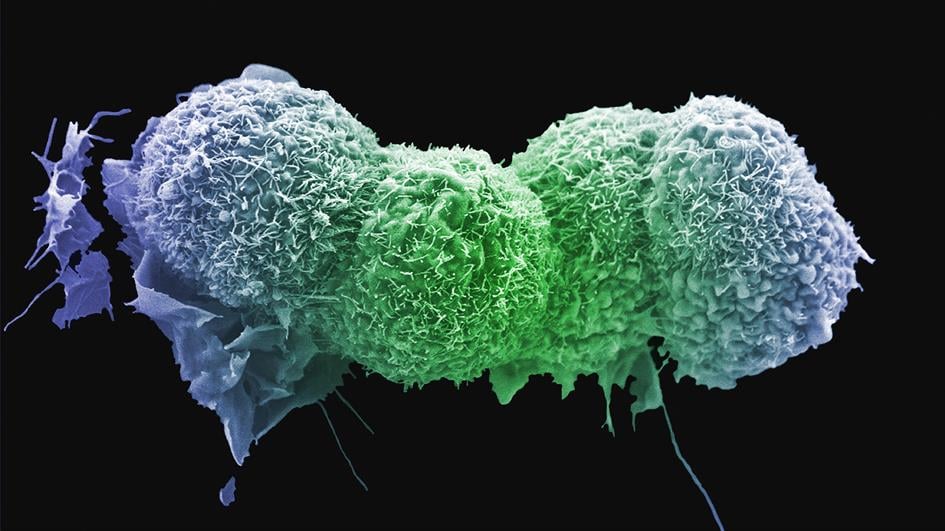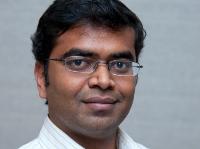 Image: Lung cancer cells. Credit: Anne Weston, Francis Crick Institute (CC BY-NC 4.0)
Image: Lung cancer cells. Credit: Anne Weston, Francis Crick Institute (CC BY-NC 4.0)
The Institute of Cancer Research, London has launched a new virtual research centre to connect and develop cancer scientists around the world.
The Centre for Global Oncology is a virtual research centre that will help better connect our researchers with colleagues in lower- and middle-income countries and take a global approach to cancer research.
Global cancer inequality
Cancer is a global challenge affecting millions worldwide. In 2012, 65 per cent of all cancer deaths globally occurred in lower- and middle-income countries (LMICs), and their cancer burden is increasing – it is set to rise to 75 per cent by 2030.
There are major inequalities across the world in treatment, with many people in LMICs lacking easy access to therapies that people in higher-income countries would regard as standard – let alone some of the more innovative and expensive newer drugs, which have been adopted in more affluent societies long before they will become established elsewhere.
Additionally, the cancer burden in many of these countries is growing because of environmental factors such as diet and increases in alcohol consumption and smoking.
There are also big differences in the biology of cancer depending on factors including nationality and ethnicity. Historically, research has focused on cancer in populations with a predominantly European ancestry – leading to big gaps in our understanding of cancer as a global disease.
And, the global cancer research community is skewed – with fewer researchers and less funding based in LMICs. For instance, Africa accounts for less than one per cent of worldwide research publications, but nearly 15 per cent of the world’s population.
Tackling inequality
However, in recent years the ICR has been playing a UK-leading role in developing new collaborations across the world that aim to redress the balance – working in partnership with researchers in countries including Ghana, Tanzania, India, Bangladesh, China, Lebanon, Nepal and Brazil to gain greater understandings of cancer as a global disease.
And our new Centre for Global Oncology aims to take on global cancer research in both ways: first by helping to develop cancer research, training and infrastructure in LMICs, and second by focusing on molecular and genetic profiling for prevention, early detection and treatment for people affected by cancer in groups who have been historically under-represented in research studies.
‘A global challenge’
 Dr Anguraj Sadanandam is the Director of the Centre for Global Oncology and Systems and Precision Cancer Medicine Team Leader at the ICR.
Dr Anguraj Sadanandam is the Director of the Centre for Global Oncology and Systems and Precision Cancer Medicine Team Leader at the ICR.
He said: “Cancer is a global challenge and we need to work together as a research community to tackle it. When we share resources and learnings it moves forward cancer research as a whole and strengthens the impact. I hope the new Centre of Global Oncology leads to greater international collaboration to help improve the lives of people all around the world.”
Dr Sadanandam was inspired to found the Centre for Global Oncology based on his personal experience an international cancer researcher. When he first began collaborating with researchers and clinicians in India a decade ago, he noticed there were gaps in the field on genomics and a lack of connections with the wider research community.
As he spoke with other cancer researchers, he saw that they faced similar challenges although in other countries and other fields. Now, he hopes that the new Centre can help scale up smaller, individual collaborations to help cancer scientists take a more global approach to research.
And he’s hopeful – after all, the global research response to the Covid-19 pandemic has already demonstrated the potential for international collaboration and openness with data to take on global challenges.
Connecting cancer data around the world
One specific programme from the Centre for Global Oncology will aim to develop physical biobanks for cancer samples, including tissues and liquid biopsies as well as data science hubs, between LMICs and the ICR.
Dr Maggie Cheang leads the ICR’s Clinical Trials and Statistics Unit (ICR-CTSU)’s Integrative Genomic Analysis in Clinical Trials team, and is Head of Clinical Informatics at the Centre.
She said: “Data and research should know no bounds. However, some countries and areas of science are less represented and connected in cancer research. Closing the data gap is key to creating a more connected world of science and tackling cancer health disparities.”
Pioneering global cancer research
Here are three recent examples of projects involving ICR researchers that have looked for clues about the causes of cancer in populations of non-European ancestry – and are also helping further our knowledge of how environmental, biological and genetic factors may be contributing to cancer health disparities.
Firstly, some of our researchers, led by Dr Sadanandam, have collaborated on the Indian Cancer Genome Atlas project, with the aim of examining genetic factors that may explain differences seen in cancer rates and mortality in India, compared to countries in the West.
The aim of the Indian Cancer Genome Atlas project is to create an open-source, comprehensive cancer database specific to India. The genetic make-up of Indians’ cancers can differ from those from the West – meaning that the insights the Indian database will help researchers improve the way cancer is diagnosed, treated and prevented in the country.
The importance of studying diverse populations
Another group of ICR researchers, including Dr Jyoti Choudhary, worked recently with colleagues at the Academia Sinica and the National Taiwan University to carry out the most comprehensive study ever conducted into the biology of lung cancers in an East-Asian population.
The majority of the patients involved in the study were non-smokers, and researchers found that their disease was molecularly diverse and different from disease that is typically seen in smokers. The study revealed new tumour characteristics that could inform treatment strategies.
The global hunt for prostate cancer predisposition genes
Finally, the ICR’s Professor Ros Eeles also coordinates efforts to track down the genes responsible for prostate cancer risk – and has played a key role in founding and expanding a major international consortium to gather genetic data from populations internationally.
Professor Eeles is responsible for setting up PRACTICAL, an international consortium that helps scientists find and evaluate potential prostate cancer risk genes. Researchers from every corner of the world can contribute DNA from prostate cancer patients, depositing results from analyses of this into a communal bank. This global resource of results from genetic samples is extremely useful in helping assess the risk associated with different genes.
The PRACTICAL Consortium involves 133 different study groups, incorporating sites in the EU, Australia, Malaysia, China, Japan, India, Africa, Canada and the US. At present, researchers can access samples from over 120,000 prostate cancer cases. These numbers are constantly increasing with the incorporation of new groups.
“The PRACTICAL consortium was established back in 2007 and involves many different study groups around the world. Thanks to this international collaboration, we have been able to accelerate our understanding of the influence of gene alterations on cancer risk in different populations.”
The ICR is already a pioneer in research to explore the nature of cancer in groups who have been historically under-represented in research. The Centre for Global Oncology will further help us to build on this research and, ultimately, aims to help reduce inequalities in global cancer treatment.